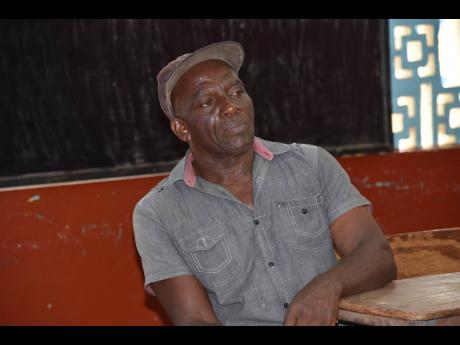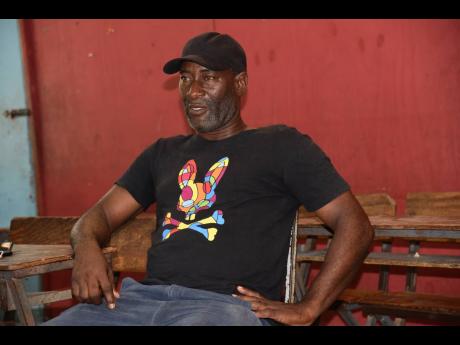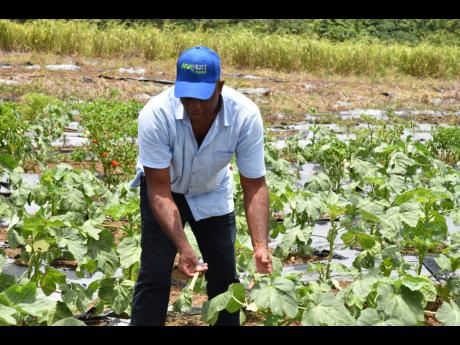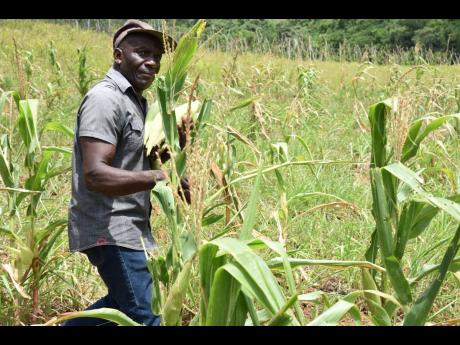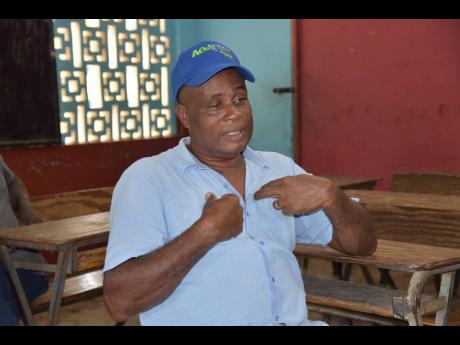Jamaica’s farmers suffering in silence
Drought-stricken fields, exorbitant water costs lead to food crisis
WESTERN BUREAU:
The lush, vibrant fields that once flourished with life in Clark’s Town, Trelawny, are rapidly becoming barren, dry wastelands. At the same time, the dreams of hardworking farmers have withered away under the scorching sun, leaving behind a heartbreaking tale of struggle and despair.
The Clark’s Town Farmers’ Cooperative, representing more than 35 farmers, has sounded the alarm, but their voices have continued to fall on deaf ears, as they believe the Government has remained indifferent to their plight.
Water, the elixir of life, has become a luxury beyond the reach of these farmers. Speaking with The Gleaner, Patrick White, chairman of the Clark’s Town Farmers’ Cooperative, highlighted water as one of the most critical issues they face. He lamented how the promise of water supply has turned into a mirage of broken commitments. These lands, once leased at what seemed like manageable rates, have seen staggering increases, now at approximately $7,500 per acre, leaving the farmers struggling to make ends meet.
“We think the costs for the lease are too high,” White said. “Government don’t exist to make money from smaller farmers. It suits the government more to give small farmers the opportunity to produce so they can increase their livelihoods and improve quality of life for everybody.”
Oliver Green, a displaced sugar cane farmer, shared his harrowing experience of transitioning to vegetable and root crops. The lack of support after the sugar crop industry ended left him with limited resources to venture into new farming practices. The drought, which has been tormenting the region since November of last year, has destroyed any hopes of success for Green and many others like him.
“We’re suffering more now, because we believe sitting on the Queen of Spain Valley where we think we have a body of water underground, it’s so easy to access the water and to help us that we could continue our vegetable and root and tuber farming. Most of our crop will not grow unless there is moisture. So, we are having serious, serious issues,” Green said.
GRIM PICTURE
John Cook, another farmer in the Clark’s Town area, painted a grim picture of the effects of the drought. He explained how the lack of water meant losing everything he invested in his crops.
“I can’t reap nothing at all. The drought. You get one shower a rain, and then two showers. You plant, and for the other two, three weeks, sun, sun, sun. So, it’s very much hard,” Cook said in frustration. “The drought just dries it right up... . So, I lost, approximately $500,000, and when I say $500,000, I have to put my manual strength in it.”
The situation is exacerbated by the extortion-level costs associated with water transportation. The farmers, who can hardly afford the steep lease rates, are left with no choice but to purchase water at $99 per cubic metre, which is relatively affordable. However, the transportation costs of approximately $10,000 per trip for a load prove to be the breaking point for many small farmers.
“Now this watermelon, that basically dry up by the drought, because this farmer cannot afford to buy and transport the water, so this dry,” White shared with The Gleaner during a tour of an abandoned farm. “Again, we can see here sweet pepper basically dry up, no water. [The farmer] have the drip structure right here, but you have to pay for the water and transport it, and that is costly. The cost has gotten so exorbitant that this farmer got frustrated and give up. Give up the ghost.”
The repercussions of the water scarcity and failed crops extend far beyond the fields of Clark’s Town. The scarcity of produce has led to a food shortage across the nation, sending prices of basic food items soaring. Sweet pepper and Scotch bonnet peppers, once a staple in Jamaican households, have become unaffordable luxuries for many.
“Scotch bonnet pepper is as high as $400 per pound and $150 per dozen,” stated Green. “That is huge business for the farmers, yes, but it’s not good for the domestic housewife because it is actually out of their reach. So, the more we grow, is the best we can supply our people in our country. They don’t have to pay this large sum of money, because it’s a scarcity and demand that cause the price to rise so high.”
UNFULFILLED PROMISES
Despite the cries of farmers like Green, Cook, and White, the Government seems to have turned a blind eye to their pleas. Requests for assistance have gone unanswered, they say, with promises of support remaining unfulfilled. The Clark’s Town Farmers’ Cooperative has reached out to various agencies, including the Ministry of Agriculture and the Sugar Company of Jamaica (SCJ) Holdings, but they say their appeals have been met with silence and inaction.
“On the 3rd of November last year, 2022, we travelled from Trelawny here to the Jamaica Association Sugar Technologies Conference in Mandeville just to meet with the minister of agriculture and the permanent secretary, and they agreed with us that we should have more control over our affairs,” White said. “But, since then, I’ve heard nothing from them. I wrote to SCJ myself. I spoke to them on the phone and I wrote them and they have not responded.”
As the farmers’ spirits crumble under the weight of uncertainty, they have one simple solution that they believe will alleviate their suffering: pipeline water directly to their farms. The underground water resources are within reach, and a one-time capital investment in water infrastructure could secure a stable future for these farmers, and food security for Jamaica. Instead of relying on expensive water transport, they are beseeching the Government to take the initiative to make water more accessible and affordable for these struggling farmers, by cutting out the need for transportation.
The plight of the Clark’s Town Farmers’ Cooperative is not an isolated incident; it resonates across other regions of Jamaica as well. Countless small farmers throughout the country are grappling with the same issues, facing the threat of bankruptcy and loss of livelihood.
They feel it is high time the Government heed their cries, listen to their needs, and take decisive action to support Jamaica’s agricultural backbone. They say the fate of countless families depends on it, the nation’s food security is at stake, and the time for action is now.
“Only through a collaborative effort between the Government and the farming community can we hope to bring an end to this devastating crisis,” said White.

